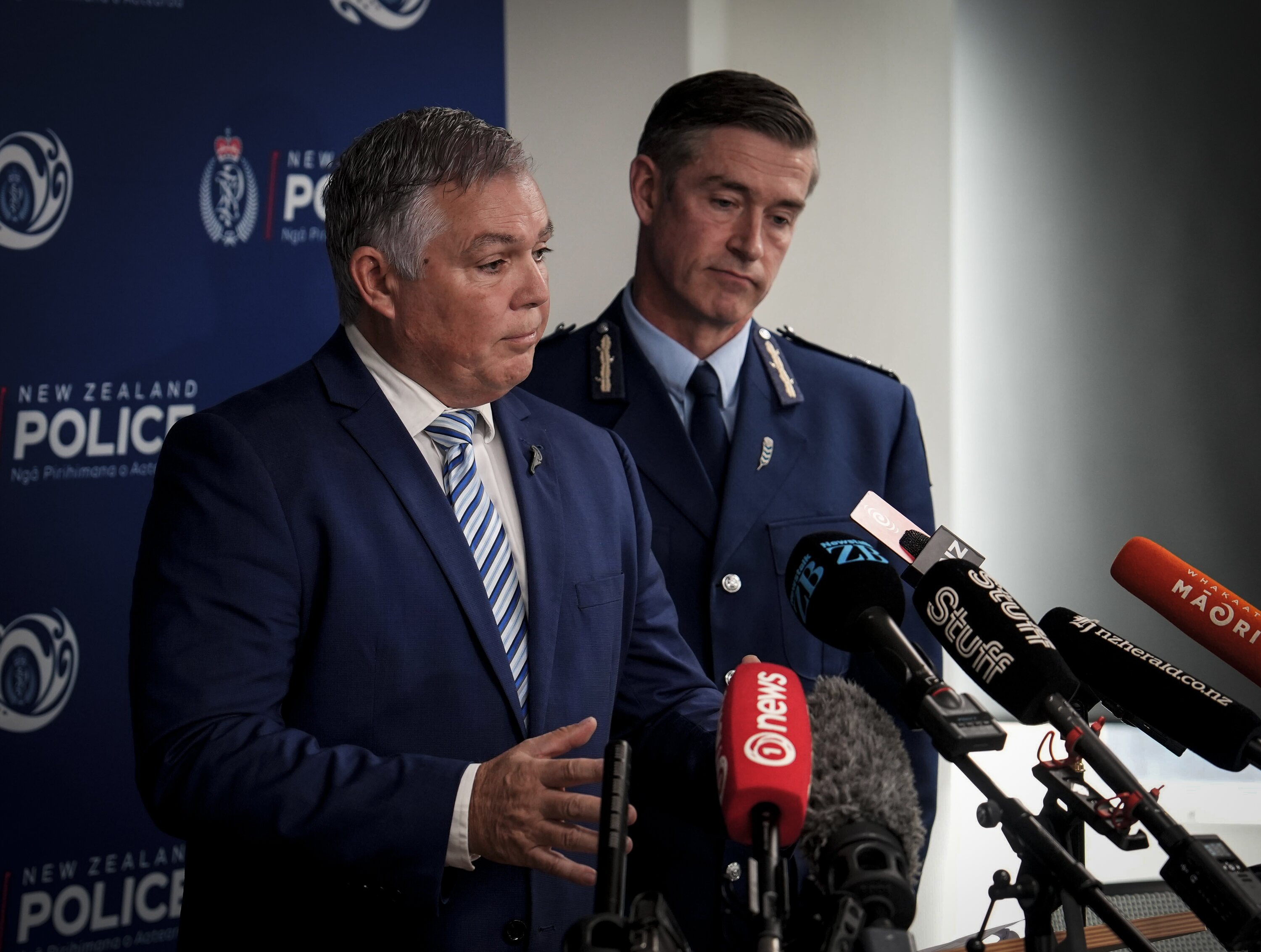
The coalition Government and Police Commissioner have both insisted their newly announced national gang unit will differ from the highly successful police task force Operation Cobalt, explaining there are clear differences between the two.
Police Commissioner Andrew Coster announced the new gang unit at Auckland's police headquarters in College Hill yesterday, alongside Police Minister Mark Mitchell. They outlined the broad plan for the specialised unit, which will have 25 to 30 people and up to seven ring-fenced officers in every police district.
Talking to Newstalk ZB yesterday, Coster said he didn't want to get too far ahead of announcements resulting from Budget 2024 - which would be funding the unit - but said district police staff would be consulted and the teams would comprise both new and existing staff and resources.
"Each team will consist of about seven people and they will be across the vast majority of our policing districts - some areas may need more," he told Heather Du Plessis-Allan Drive.
"They form the nucleus of our focus on gangs but clearly we need to mobilise other resources like Armed Offenders and so on to support our intentions."
This morning, Coster appeared again on The Mike Hosking Breakfast - where he was asked by host Andrew Dickens about Labour calling the new gang unit a national version of Operation Cobalt.
Operation Cobalt was a specialised police task force launched at the end of 2022 to target organised crime. In September last year, it reached a milestone of 50,000 charges laid against gang members and associates.

Launched under the previous Labour Government, Cobalt has seen police seize over 500 firearms and issue almost 65,000 infringement offence notices.
But Coster said there would be clear differences between the successes accomplished through Operation Cobalt and the National Gang Unit.
Gangs will receive disruption notices and dispersal notices to prevent them wearing patches and gathering - in a similar method to Australia.
"Operation Cobalt has been successful and we want to continue those initiatives through the work of this group, but the new thing will be powers that enable police to disrupt gangs in a different way - how we organise ourselves to do that really well so those groups will support us in that legislation," he told ZB.
The same question was put to Minister Mitchell this morning, asked by Labour's Police spokeswoman Ginny Andersen.
Andersen claimed the new gang unit was "the same thing with a different name", with the same number of detectives and police officers set to be involved.
"We put $94 million into organised crime and 700 officers, which is 200 more than what National has promised, specifically into organised crime," said Andersen.
But Mitchell rejected Andersen's claims as "not true" and accused the Labour spokeswoman of calling Coster a liar.
"Ginny is [talking about their] National Organised Crime Group - that is based in an HQ in Wellington. They do not have the districts, they don't have the dedicated gang disruption unit - [now] they're getting it," said Mitchell.
"Police don't have a national gang unit that's co-ordinating those units on the ground with intelligence, support and information - they're getting that. The commissioner has been very clear that police don't have this capability and now they're getting it.
"Operation Cobalt, for all the good things that it's had, is an operation."
National had floated the idea of a gang-fighting squad in 2020 - modelled on the Strike Force Raptor squad in New South Wales. The squad has been responsible for more than 7500 arrests since its inception in 2009.
Coster said during the announcement that gang members commit a large proportion of crime - 8 per cent of all violence and 18 per cent of serious violence.
But despite another clear move from the Government to crack down hard on crime, concerns were raised within the police sector about the logistics of how the units would be directed in practice.
The Police Association's Chris Cahill said in theory the unit was a good move. He compared it to the template of Operation Shovel carried out by the Government in Timaru back in the 1990s, which cracked down on several gangs operating in the township.
But his concerns were around the lack of details given by the minister and the Police Commissioner.
"It's come with no actual facts around what the extra resources and budget will be. If it doesn't have those things attached to it you're just asking the same staff to do more work or you're moving staff around, and so we really want to see the facts around that," said Cahill.
"it's great to have a focus, but as I say we're already overworked and what are we gonna drop? The commissioner said yesterday they'll be doing less mental health and less family harm [response], but we've been hearing that story for a couple of years now and it just hasn't happened. So there's a fair bit of scepticism out there."
Cahill said police were keen to get stuck into tackling gang crime and they believed there has been too much leeway for gangs and not enough emphasis on policing them. Police workloads had prevented them taking the desired level of action .
"I'm nervous when you make an announcement and you don't follow it up with details of the resourcing and the budget, that makes me very nervous it's an announcement without any teeth."
Take your Radio, Podcasts and Music with you









